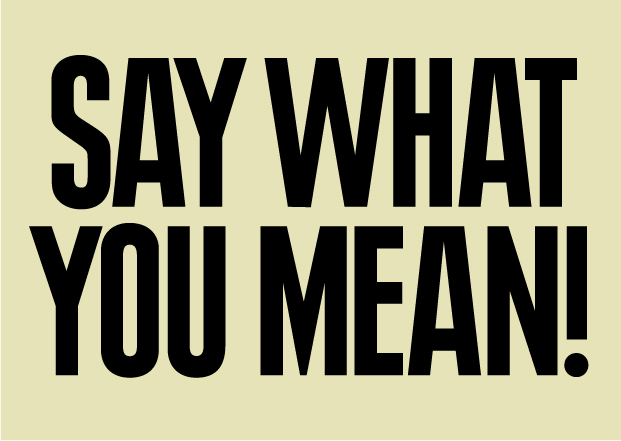Just say what you mean
 If you want to build credibility as a communicator, here’s a piece of advice: just say what you mean.
If you want to build credibility as a communicator, here’s a piece of advice: just say what you mean.
Too often communicators outsmart themselves by trying to anticipate what their readers are thinking, and then bending their message to fit the contours of those imagined thoughts. But doing this makes you appear weak, unconvinced of the strength of your own message. It signals that you have no confidence in the ability of your message to change peoples’ minds, so you have to change the message instead. Strong messages drag the audience to them, rather than scurrying to meet the audience where they already are.
For an example of what I’m talking about, look at the way Washington Post publisher Katharine Weymouth announced that her paper would no longer have a position for an ombudsman:
The world has changed, and we at The Post must change with it. We have been privileged to have had the service of many talented ombudsmen (and women) who have addressed readers’ concerns, answered their questions and held The Post to the highest standards of journalism. Those duties are as critical today as ever. Yet it is time that the way these duties are performed evolves…
In short, while we are not filling a position that was created decades ago for a different era, we remain faithful to the mission. We know that you, our readers, will hold us to that, as you should.
In her announcement, Weymouth takes pains to tell readers that while the position of ombudsman will no longer exist, the principles that animated that position are still held in high esteem at The Post; and those principles will continue in practice at the paper, just in different forms.
The thing is, she almost certainly does not believe a word of this.
If she was being honest, her statement would have gone more like this:
“Look. Paying for an in-house critic made sense back in the days after newspaper consolidation, when the one newspaper left standing in a city had a de facto monopoly over news in that city. But those days ended decades ago. Today even a one-newspaper town like Washington has a wide range of other news providers — on TV, on radio, and online — all of whom can challenge us if we get our facts wrong. And if readers have concerns about our coverage, they have tons of ways to express that concern independently of us, through blogs and status updates, Twitters and Tumblrs.
None of which would matter much if we were rolling in cash here at The Washington Post, but you might have noticed from the ever-shrinking size of your print edition that we are not. In fact, we’re using all our powers just trying to figure out how to keep this ship afloat. So we can’t afford to hang on to things that don’t make sense anymore. And an ombudsman is one of those things; the position just doesn’t make sense anymore.”
Notice how, rather than trying to convince the reader that, despite appearances, The Post is actually not doing anything that different, this version accepts that something different is happening, and lays out a case for why it needs to happen. It accepts that the reader may disagree with the decision that was made, and attempts to convince them that they shouldn’t, rather than falling all over itself pandering to the reader’s existing opinion.
In other words, it treats the reader as a thinking adult, rather than as a dullard.
This is the power of just saying what you mean. People aren’t dullards; they know when they’re being talked down to, or around, or condescended to. And this kind of “despite what you see all around you, trust me, nothing has changed” rhetoric sets off those alarm bells rather loudly. It makes you wonder what else you aren’t being told, rather than reassuring you that the person doing the telling knows what they are doing.
Be brave. Have faith in your decisions. Say what you mean.

Comments
Ginger
March 4, 2013
2:35 pm
Good post! I actually saw The Post was getting rid of their ombudsman, and read a few letters to the editor about how that was a bad idea, so I was kind of sad. But if she’d put it how you did, I now see it has to happen, and it’s not going to be the end of the world.